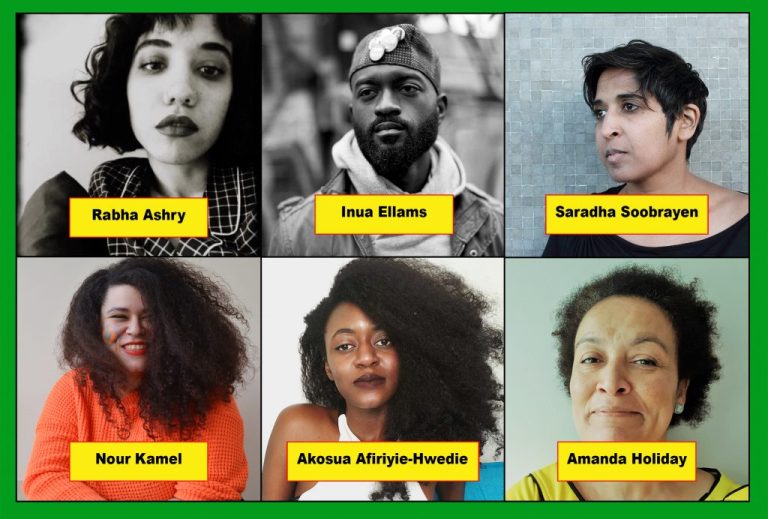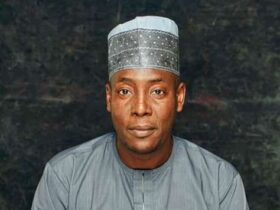As you read through this review, please note that the explanations and views given here are absolutely my articulated thoughts and personal perception of this year’s shortlist. This write-up is in no way influenced or linked to the views or intentions of Konya Shamsrumi, the establishers of the Brunel Poetry Prize or the shortlisted poets. For biographies of the shortlisted poets and their poems, please visit the prize website. .

Once again, the Brunel International African Poetry Prize has come up with an exciting shortlist of six poets who offer a conglomerate of brilliant poems with diverse themes. Two of the poets, Inua Ellams (Nigeria) and Saradha Soobrayen (Mauritius), have been shortlisted before. Completing the shortlist of six are:
- Nour Kamel (Egypt)
- Amanda Holiday (Sierra Leone)
- Akosua Afriyie-Hwedie (Zambia/ Ghana/ Botswana)
- Rabha Ashry (Egypt).
Inua Ellams (Nigeria)
In a competition as stiff as the Brunel Prize, and in any other credible one, I want to believe that cohesion is key. And it is this one thing among many that screams most prominently in Inua’s batch of poems.
First, we see this in his titles (titles matter because they draw in the reader’s curiosity). What is the significance of the f-word in Inua’s titles? Remove the slash and you get a hint of what the poet is trying to explain. He’s merely saying to hell with so many demons. This might sound mundane, but I think it’s the poet’s intention to make his feelings known that he wants freedom and cares not about several entities. Reading through, you find out that he talks of anxiety, frustration and identity as central themes.
In Fuck / History, the persona reminisces about childhood; about fitting in where belief is met with doubts; about how language chiefly betrays one. The persona is at war with a way of being. The following lines speak volumes of the poet’s situation:
...Sometimes I dream in Hausa and have no idea what is being said / Sometimes Arabic calligraphy looks to me like flowers on fire /...
And we see that circumstances can change one’s perception as the following lines portray:
...When the Imam's thug aimed an AK at our car / I still believed / until I stared down the barrel and saw no light at the tunnel's end..."
Ellams carries this frustration and anxiety into “Fuck / Nigeria”. Here he speaks about the sad reality of war. How home becomes a place of constant fear, blood and smoke. How war ravages the innocent and everywhere becomes messed up. The poem is reminiscence of Rasak Malik Gbolahan’s ideals so much so that one could be forgiven to even mistake it as one of Rasaq Malik’s. It’s one of the strongest poems in the batch.
And in Fuck / Boko Haram, we are served the harsh truth of gullible boys being recruited to fight for a cause by those who deprived them of their progenitors. We see how religion is been employed, insincerely carved to lure them. And the cycle of deception and bloodshed continues.
In Fuck / Swamps, I think the Poet’s persona is bent on making an attempt at laying to waste what he deems as anomalies. He’s merely seeking a cure.
"I carry them into the water..."
Should mean an attempt at purification, rebirth, or simply change. These are possible angles to look at the poem.
One other poem I find interesting is Fuck / Boys. Here we see how boys are molded into men who are told not to feel pain—because men should not show weakness. Emotions make us weak. In the end, such a man is believed to posses a heart of stone. What I love about this poem is the blatant manner in which it commences:
It starts early / A man compliments the tight nut of his grandson's fist.../ The any strikes and winces / shake it off / we are men / we feel nothing...
Inua Ellams doesn’t mince words. What puts him in good stead for the prize is cohesion and a dignified clarity. He is a front runner for the prize
Akosua Afriyie-Hwedie (Zambia / Ghana / Botswana)
Over the years, we’ve become conversant with how the Brunel Prize tends to bring to the fore fresh, exciting voices who are lesser known in the African terrain. Say Elhillo, Adesina, Shire and others. In this vein, I think they’ve uncovered a gem in Akosua Afriyie-Hwedie.
Akosua is the Theresa Lola of this year’s shortlist. There is something nuanced about her poems that keeps you going on and on. An ability to startle, armed with a bag full of wits which makes it harder to predict how the next line will turn out. She turns language to dough and molds it into different items of equal variant shapes and sizes.
Identity is central to her Brunel Prize offering. In I’m deciding which language to spend the night in, we find a struggle for identity, how when faced with different ways of being, confusion is what we beget. There’s a hint of what colonialism does. It leaves us with a language foreign to our ideals. And there’s a clash between mother tongue and the one enforced by circumstance.
In the poem, Condition, she plays a fast one on our senses with this:
Brenda Fassie sings another Brenda Fassie...
First you think it ridiculous but the next line reveals that the poet knows her art well. The graceful use of enjambment makes her work startling. But that poem (Condition) which for me, towers above the rest, speaks of that softness in men been often dismissed. The act of unbraiding a woman’s hair by a man is often frowned upon, and I believe it’s this perception that Akosua tries to challenge.
Long distance is a poem which speaks volumes of Akosua’s brilliance. She tackles what I call hypocrisy in the diaspora. How finding ourselves in a foreign place suddenly makes us search and care for our kind, those who perhaps can give us a taste of home. I give it an interpretation of loss too. Being in a certain place takes something away or inputs something different in one. Aside these, the play with words is just something to read and take delight in.
Philosophy comes to light, albeit subtly, in How would your hand treat you if they were not yours? In a series of questions, Akosua interrogates our deeds as humans. If the table is turned or when subject becomes predicate, whether one would still bear with glee, the consequences.
In general, I prefer to just go through Akosua’s poems without being on the lookout for perception, because they possess mines of beauty. Akosua is definitely a top contender for the prize.
Rabha Ashry (Egypt)
Sometimes you fall in love with certain poets not because they are overtly sublime but because their poems click something in you. This is the case with Rabha Ashry. Her poems possess subtlety that is inexplicable. They are silent yet loud in beauty. In the shortlist, I feel Rabha Ashry’s place is akin to that of a brilliant student who prefers to take the back seat and is quiet, disinterested in what goes on around. But her intelligence is undoubted. Her poems shimmer. They come alive in a silent way. Anxiety and innocence run through them. Here, displacement and identity take central stage.
The poem, Wrong, gives us a biological progression of the persona and the duties assumed to be attached at each turn. I think there’s a battle to fit into a society which pressures one with a certain predestined pattern to life. This still is evident in poems like Pray where she says:
I don't know a god / just mama's green eyes following me / I pray too fast she says / I stumble...
and Red sea, with these lines:
... I'm trying to explain why I fixate on beaches meant for winter.
Red sea also expresses a longing for home or past memories.
In subtler but anxiety-filled poems like drums, half asleep, on the wall and red ink, there is quivering, nostalgia and sickness for things abandoned or lost. Rabha manages to warm her way into the reader’s heart with lines that read hallucinatory, like water gushing fast from a hose. At one point, you feel the lines do not add up. But a child-like tenderness, an aura that runs through like a river which one can’t miss, survives. I believe there is more to come from Rabha Ashry in the African poetry scene.
Read Part TWO
Hussani Abdulrahim is a graduate of Pure Chemistry from Usmanu DanFodio University, Sokoto, Nigeria. He has received several recognitions for his writings, including, 2019 Poetically Written Prose Contest (winner), Boston Review’s Aura Estrada 2019 Short Story Contest (finalist), 2019 Awele Creative Trust Short Story Contest (shortlist), WRR Green Author Prize 2016 (joint-winner), 2018 Africa Book Club short story contest (finalist), Nigerian Students Poetry Prize 2019 (shortlisted), Ken Egas Poetry Prize 2018 (shortlisted), Eriata Oribhabor Poetry Prize 2019 (shortlisted) , Wordiators Championship 2018 first runner-up, 2018 ANA Kano/Peace Panel Poetry Prize (winner)… His works are forthcoming or have appeared at Boston Review, the art-musefair, praxismagonline, BPPC anthologies and several others. He resides in Kaduna and is currently working on a poetry chapbook and a collection of short stories. He believes that words have the power to heal the world of its numerous ills.
- CALL FOR SUBMISSION: Dear Yusef: Essays, Letters, and Poems For and About One Mr. Komunyakaa - May 25, 2022
- #SubmitNow: Awaiting Revolution Poetry/Essay Anthology - May 21, 2022
- The Straight Path | Adamu Yahuza Abdullah - May 20, 2022












Leave a Reply